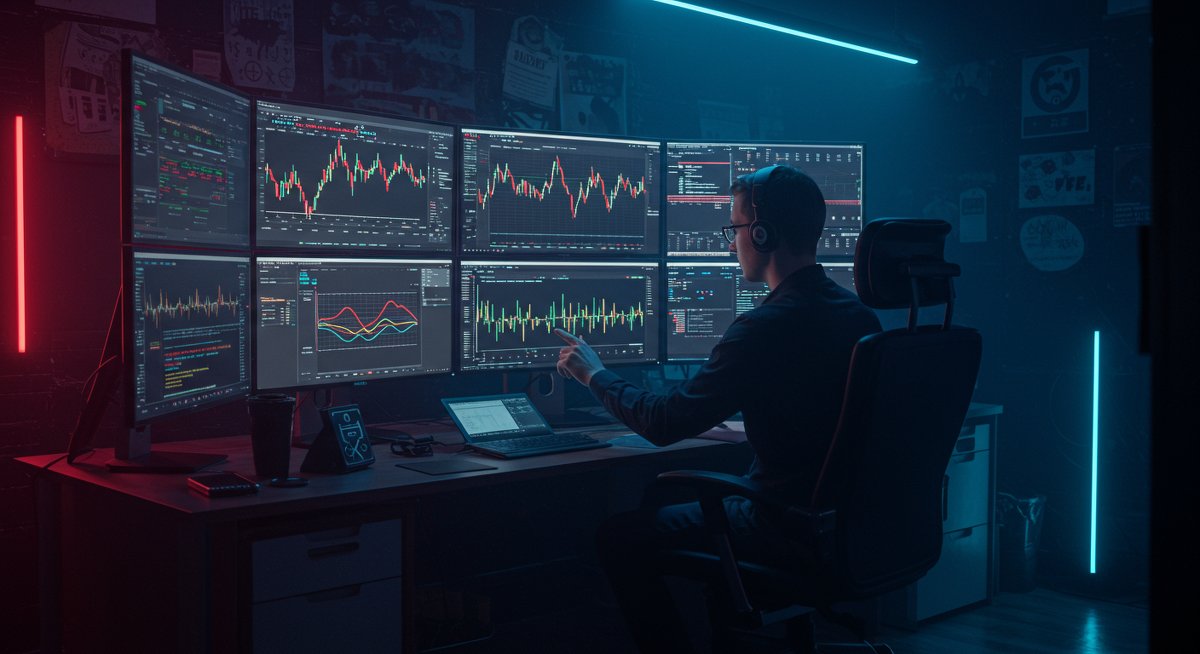Why This Reddit Post Grabbed My Attention
So, I was browsing r/ethtrader the other day, and a post about SharpLink (SBET) caught my eye. The title was something like, "SharpLink Just Added Another 77,210 ETH ($295M) — Now Holding 438,017 ETH. This Is Bigger Than Anyone Realizes." Okay, that’s a pretty bold claim. Naturally, I had to dig in. What struck me wasn't just the sheer volume of ETH they were accumulating, but the strategy behind it. In a market saturated with noise and fleeting trends, a company going all-in on Ethereum like this feels… different. It feels like a calculated bet on the future of decentralized finance, and that's the kind of thing that piques my interest as a trader.

But here's the thing: the crypto world is full of announcements and promises. It's easy to get caught up in the hype and forget the fundamentals. So, I wanted to take a closer look at what SharpLink is actually doing, and what it could mean for the rest of us, especially those trading outside the US. Because let's face it, regulations, access, and even tax implications can vary wildly depending on where you live. What looks like a golden opportunity in one country might be a compliance nightmare in another. The Reddit post definitely sparked my curiosity, but it also raised a bunch of questions that needed answers. Is this a legitimate long-term strategy, or a risky gamble? And more importantly, how can individual traders like you and me potentially benefit from this trend – or protect ourselves if things go south? That's what I intend to explore.
Decoding SharpLink's Ethereum Play
Let's break down what's actually happening here. SharpLink Gaming, a publicly traded company (that’s the SBET ticker), is aggressively converting its treasury into Ethereum. We're not talking about dabbling; we're talking about a full-scale pivot. According to the CoinTelegraph confirmation mentioned in the Reddit post, they've added another 77,210 ETH, bringing their total holdings to a staggering 438,017 ETH. That's roughly $1.69 billion worth of ETH at current prices. Now, why is this significant? Well, most companies hold their reserves in traditional assets like cash, bonds, or maybe some real estate. But SharpLink is betting big on a digital asset – and specifically, on Ethereum. The Reddit post emphasized that the dollars raised are being directly recycled into ETH, which is a key point. They aren’t using the funds for operational expenses, marketing campaigns, or to pay off debts. It's a direct accumulation of ETH. This suggests a strong belief in Ethereum's long-term potential.
But here’s where it gets interesting: this move effectively ties SharpLink's value to the price of Ethereum. As ETH goes up, so does the value of their treasury, and theoretically, their stock price. It's a high-stakes game, but if their bet pays off, the rewards could be substantial. What makes SharpLink's approach unique is that they're not just passively holding ETH; they're building an ETH-native infrastructure. This implies they plan to actively use their ETH holdings within the Ethereum ecosystem, potentially through staking, DeFi protocols, or other yield-generating activities. If they successfully integrate ETH into their core business model, it could create a powerful synergy between their gaming operations and their crypto treasury. This is more than just a treasury play; it's a fundamental shift in how the company operates and how it derives its value.
What This Means for Your Crypto Portfolio
So, SharpLink is betting big on ETH. What does that mean for your own crypto strategy? Well, first, it's a reminder of the importance of diversification. While SharpLink is going all-in on ETH, that doesn't necessarily mean you should. As any seasoned trader knows, putting all your eggs in one basket is a recipe for disaster. However, SharpLink's move can be seen as a bullish signal for Ethereum. If a publicly traded company is willing to allocate a significant portion of its treasury to ETH, it suggests that they see considerable upside potential. This could give you more confidence in your own ETH holdings, or perhaps encourage you to consider adding ETH to your portfolio if you haven't already.
But here's the crucial part: don't just blindly follow what SharpLink is doing. Do your own research. Understand the risks involved. Consider your own financial situation and risk tolerance. Before diving into anything, I always use KuCoin to look at charts, indicators and price history - it's crucial for making informed decisions. What works for SharpLink might not work for you. Instead, use their strategy as a starting point for your own analysis. Think about how Ethereum fits into your overall investment goals. Are you looking for long-term growth, or short-term profits? Are you comfortable with the volatility of the crypto market, or do you prefer more stable assets? Ultimately, the decision of whether or not to invest in Ethereum is yours alone. But by understanding what SharpLink is doing and why, you can make a more informed choice.
The Risks Lurking Beneath the Surface
Okay, let's talk about the stuff nobody wants to talk about: the risks. While SharpLink's Ethereum strategy might seem like a stroke of genius, it's not without its downsides. The most obvious risk is the volatility of the crypto market. Ethereum, like all cryptocurrencies, is prone to wild price swings. If the price of ETH crashes, SharpLink's treasury could take a significant hit, which could negatively impact their stock price. There's also the risk of regulatory changes. Governments around the world are still grappling with how to regulate cryptocurrencies. New laws and regulations could make it more difficult or expensive for SharpLink to hold and use their ETH holdings.
Beyond price volatility and regulation, there's also execution risk. SharpLink's strategy relies on their ability to successfully integrate ETH into their business model. If they fail to do so, their ETH holdings might not generate the returns they're hoping for. And let's not forget the risks associated with smart contracts and DeFi protocols. Hacks, bugs, and exploits could lead to the loss of their ETH holdings. It's also worth noting that SharpLink's strategy is relatively new and untested. There's no guarantee that it will work in the long run. The market might not react the way they expect, or unforeseen challenges could arise. Before investing in SBET, it is essential to understand the risks outlined in their filings with the Securities and Exchange Commission. Always do your own research and decide if the risks are tolerable for your portfolio. Keep in mind that the company's filings also contain forward looking statements that may not come to pass.
Trading Ethereum From Different Countries
If you're trading from outside the US, there are a few extra things to keep in mind. First, you'll need to check your local crypto regulations. Some countries have strict rules about owning and trading cryptocurrencies, while others are more lenient. Make sure you understand the regulations in your country before you start trading. Tax implications are also important. Depending on where you live, you might have to pay taxes on any profits you make from trading Ethereum. Consult with a tax advisor to understand your tax obligations. Access to exchanges can also vary depending on your location. Some exchanges might not be available in your country, or they might have restrictions on the types of cryptocurrencies you can trade.
Finally, be aware of currency exchange rates. When you're trading from outside the US, you'll need to convert your local currency into US dollars (or another currency that's accepted by the exchange). Exchange rates can fluctuate, which can impact your profits. Also, ensure that any exchange you use complies with local regulations. For example, in Europe, exchanges must comply with KYC (Know Your Customer) and AML (Anti-Money Laundering) directives. These regulations ensure that exchanges verify the identity of their users and prevent money laundering. This protects both the exchange and its users from fraud and financial crimes. Compliance with these regulations is a sign of a trustworthy exchange.

How to Actually Implement This in Your Trading
Okay, so how do you actually apply all of this to your own trading strategy? Well, if you're bullish on Ethereum, you could consider buying some ETH. You can do this through a cryptocurrency exchange like Changelly. Just be sure to do your research and choose a reputable exchange. Alternatively, you could consider investing in companies that are heavily involved in the Ethereum ecosystem, like SharpLink. This is a more indirect way to gain exposure to Ethereum, but it could potentially offer higher returns. However, it also comes with more risk, as the company's success depends on more than just the price of Ethereum.
Before making any trades, it's crucial to analyze the market. Look at the price charts, read the news, and pay attention to any relevant developments. Use technical indicators to identify potential entry and exit points. And most importantly, don't let your emotions cloud your judgment. Stick to your trading plan, and don't make impulsive decisions based on fear or greed. If you do decide to invest in SBET, consider using dollar-cost averaging. This involves investing a fixed amount of money at regular intervals, regardless of the price. This can help to reduce the impact of volatility on your portfolio. It's a good strategy if you plan to invest for the long term.
My Final Thoughts on SharpLink's Strategy
So, what's my take on all of this? I think SharpLink's Ethereum strategy is bold, innovative, and potentially game-changing. It's a clear sign that Ethereum is maturing as an asset class and that companies are starting to see its potential beyond just a speculative investment. However, it's also important to be realistic about the risks involved. The crypto market is still relatively new and unpredictable, and there's no guarantee that SharpLink's strategy will succeed.
Ultimately, whether or not you decide to invest in SharpLink or Ethereum is a personal decision. But I think it's important to pay attention to what they're doing, as it could have significant implications for the future of the crypto market. I'm personally watching this situation very closely. I’m keen to see how SharpLink's strategy plays out over the next few months and years. Maybe I'm wrong, but I think we're witnessing the dawn of a new era in finance, where digital assets play a much larger role. And SharpLink, for better or worse, is at the forefront of this revolution.